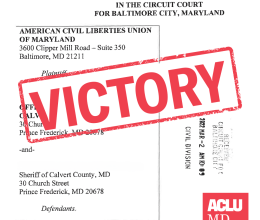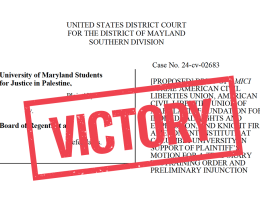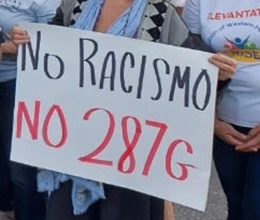
VICTORY: Judge Rejects City of Salisbury's Attempt to Dismiss ACLU Lawsuit
City Fails to Sidestep Public Release of Police Misconduct Documents
SALISBURY, MD - In an important early victory for government transparency and police accountability, Wicomico County Circuit Judge W. Newton Jackson III has decisively rejected the City of Salisbury's move to dismiss a public information lawsuit and dodge its obligations to publicly release records related to a police misconduct lawsuit by hiding the records with its outside counsel. The ACLU lawsuit seeks to enforce the Maryland Public Information Act [MPIA] and is one in a pair of lawsuits filed last June to challenge "gag orders" that silence victims of police abuse as a condition of resolving their cases. The lawsuit against the City of Salisbury was brought on behalf of the ACLU and the Real News Network, a news organization denied their First Amendment and statutory rights to obtain newsworthy public information from victims of police abuse.
"This is a powerful ruling for transparency in that the court rejected all the usual arguments and obstacles conjured by municipalities to deny the people's right to know," said Stephen Janis, investigative journalist for the Real News Network. "Hopefully this will begin the process of breaking down the barriers that have kept secret police brutality settlements across the state. The Real News is proud to join with the ACLU to fight for the public good and the rights of a free and unconstrained press."
Judge Jackson resoundingly rejected the City's claim that it could sidestep its MPIA obligations by hiding records with its insurer or outside counsel: "Were this Court to accept Defendants' argument, then any government entity could shield public records from the public's sight by transacting through their insurer or attorney."
Also important, Judge Jackson ruled that there is no "general catchall power on the part of custodians to deny [MPIA] requests" based upon confidentiality. ... "the fact that the settlement agreement contains a confidentiality agreement thus binding the parties to secrecy is of no relevance, here. The provisions of a private contract are not valid, or recognized, legal bases that would generate an air of confidentiality."
The court's opinion makes clear that the decision whether to exempt from disclosure portions of the police settlement agreement will be based on specific alleged privileges and the scope of those privileges within portions of the agreement, rather than the agreement as a whole. In addition, the judge rejected the City's claim that the agreement itself was a legal work product exempt from disclosure.
The lawsuit stems from a 2014 case in which four Salisbury University students sued the city of Salisbury and one officer with the Salisbury Police Department (SPD), alleging police brutality, excessive force, illegal seizure, detention and arrest. The lawsuit also alleged that SPD personnel confiscated surveillance footage and creative fictional narratives to cover up what happened. In 2015, the court concluded that the plaintiffs sufficiently proved illegal patterns and practices by the SPD to allow the case to move forward.
In 2016, the case was settled, but all details of the settlement, including the amount of the award, were withheld from the press and public. When the ACLU of Maryland and the Real News Network filed an MPIA request seeking documents about the settlement, the City rebuffed the request, claiming that neither it nor the SPD had any documentation regarding the settlement. This lack of transparency has caused at least one of the student plaintiffs to question whether SPD was holding its officers accountable for their actions, though he is silenced by the gag order that governs the settlement and risks losing his award if he speaks out.
"This strong ruling in Salisbury for government transparency in police misconduct settlements sends a clear and important message across Maryland that the public today is deeply concerned about police misconduct, and our government owes its citizens open transparency about its handling of lawsuits and investigations regarding abuses of police power in our communities," said Deborah Jeon, Legal Director of the ACLU.
The related ACLU lawsuit was brought against the City of Baltimore on behalf of Ashley Overbey and the Baltimore Brew, a news organization. In 2012, Ashley Overbey, then a 25-year-old Black woman, who was brutalized and wrongfully arrested by Baltimore Police officers after calling them for help after her apartment was burglarized. All charges against Ms. Overbey were dropped and she successfully sued the Baltimore Police Department. But Ms. Overbey was victimized again by the police misconduct when half of her settlement was taken away just because she defended herself in comments on a blog where members of the public disparaged her personal character for suing the police and accepting a settlement, without any understanding of the level of excessive and illegal force used by the police.
The Real News Network is represented by Charles Austin, Leslie Davis and Lauren Williams of Crowell & Moring LLP, as well as ACLU of Maryland Legal Director Deborah Jeon and Equal Justice Works Fellow Nick Steiner.
###






